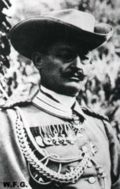Major Theodor Leutwein
From The Revolt of the Hereros:
- "a professional officer with a classical education and a background in the law. He had no experience in colonial matters and knew nothing of Africa, but he had a reputation for being level headed and judicious. In January 1894 Leutwein arrived at Windhoek." [1]
- "There had been native uprisings and, according to Leutwein, "Only the Basters of Rehoboth ... were openly on our side." Leutwein brought some stability back using a strategy of "divide et impera. From the beginning he could count on the passive support of the Hereros, for they still believed that my enemy's enemy is my friend and to them Hendrik Witbooi was still the enemy." Witbooi had refused to bow to German power and so German forces attacked his forces and he signed a peace treaty on September 15, 1894.
- "After pacifying the colony Leutwein turned his attention to the problem of encouraging European settlement, for he knew that a lasting peace would only be assured when there was a large permanent settlement of white colonists in South West Africa. [...] Leutwein encouraged the whites to become cattle ranchers. As the best grazing land belonged to the Hereros, Leutwein reasoned that some of this land would have to be acquired before bringing settlers to South West Africa. To implement this policy Leutwein induced (bribed is probably a better word) Samuel Maharero to recognize a line running from Otjimbingwe in the west go Gobabis in the east as the southern boundary of Hereroland. As a corollary to this agreement, Samuel conceded that any cattle found south of the boundary were "ownerless" and could be sold by the German government. The proceeds from such sales were to be divided equally between Samuel and the Germans. For affixing his signature to this agreement Samuel was given a retainer of 2000 marks per year.
- The legality of the document was open to question on several grounds, not the least of which was the fact that the land which Samuel so blithely sold was not his to sell: by Herero tribal custom, all land was held in common and the chief had no special rights over it beyond those of a member of the tribe. Even more blatant was the fact that Samuel had signed away a good portion of the land of the eastern Hereros, over whom he had no authority whatsoever. As soon as the cattle confiscations began, the eastern Hereros decided to resist. What was called "War of the Boundary" erupted in March 1896 and was ended by the Germans within a few weeks. Leutwein's divide-and-rule policy paid handsome dividends during the war. Not only did all the remaining tribes maintain a benevolent neutrality; some even gave assistance to the Germans. In particular, Hendrik Witbooi in accordance with his treaty obligations sent a large contingent of scouts. For their part in the uprising the eastern Herero chiefs Nikodemus and Kakimena were executed and their peoples disarmed." [2]
- From 1896 to 1903 the Hereros saw much of their best land and a good portion of their cattle pass into the hands of the white man. [3]
